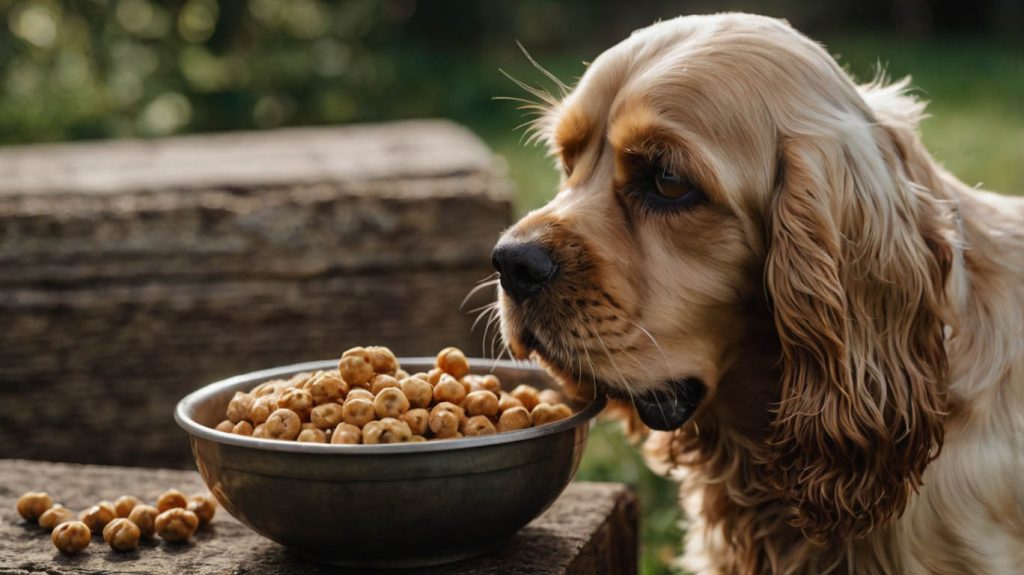Cocker Spaniels are known for their playful energy, affectionate nature, and luxurious coats. However, keeping them healthy and happy starts with proper nutrition. A well-structured Cocker Spaniel feeding chart ensures they receive the right amount of food, tailored to their age, weight, and activity level.
In this comprehensive guide, we’ll explore feeding schedules, portion sizes, nutritional needs, and real-life tips to help you nourish your Cocker Spaniel effectively. Whether you have a playful puppy, an energetic adult, or a senior dog, this guide will cover everything you need to know.
Why a Cocker Spaniel Feeding Chart is Essential
Proper feeding is not just about filling a bowl; it’s about ensuring your Cocker Spaniel thrives.
The Importance of a Feeding Chart
A structured feeding chart helps:
- Prevent obesity, a common issue in the breed
- Ensure balanced nutrition for growth and energy
- Avoid overfeeding or underfeeding
Nutritional Needs of Cocker Spaniels
Cocker Spaniels require:
- Proteins: For muscle growth and repair
- Fats: To maintain a shiny coat and provide energy
- Carbohydrates: For sustained energy
- Vitamins and Minerals: To boost immunity and overall health
When these components are balanced, your dog will lead a healthy and active life.
Cocker Spaniel Feeding Chart by Life Stage
Feeding requirements change as your dog grows. Here’s a detailed breakdown for every life stage.
Cocker Spaniel Puppy Feeding Chart
Puppies have high energy demands and require nutrient-dense food.
| Age (Months) | Meals Per Day | Portion Size (Cups/Day) |
|---|---|---|
| 2-3 | 4 | 1-1.5 |
| 4-6 | 3 | 1.5-2 |
| 7-12 | 2 | 2-2.5 |
Tips:
- Use high-quality puppy food rich in DHA for brain development.
- Avoid feeding adult dog food to puppies.
Cocker Spaniel Adult Feeding Chart
Adult Cocker Spaniels require a balanced diet to maintain energy levels and a healthy weight.
| Weight (lbs) | Meals Per Day | Portion Size (Cups/Day) |
|---|---|---|
| 20-25 | 2 | 1.5-2 |
| 26-30 | 2 | 2-2.5 |
Tips:
- Split meals evenly to avoid overeating.
- Avoid excessive treats and table scraps.
Cocker Spaniel Senior Feeding Chart
As Cocker Spaniels age, their metabolism slows down.
| Age (Years) | Meals Per Day | Portion Size (Cups/Day) |
|---|---|---|
| 8-10 | 2 | 1-1.5 |
| 10+ | 2 | 1-1.2 |
Tips:
- Choose senior dog food with joint support supplements.
- Monitor for weight gain or loss and adjust portions accordingly.

What to Feed Your Cocker Spaniel
The quality of food you choose impacts your dog’s overall health and happiness.
Dry Food vs. Wet Food
- Dry Food (Kibble): Great for dental health and easy to store.
- Wet Food (Canned): More palatable and hydrating but can lead to dental issues.
Homemade Dog Food
If you prefer homemade meals:
- Use lean meats (chicken, turkey, fish).
- Add vegetables like carrots, sweet potatoes, and green beans.
- Avoid toxic foods like onions, garlic, and chocolate.
Recommended Dog Food Brands for Cocker Spaniels
- Royal Canin Cocker Spaniel Adult Dog Food
- Hill’s Science Diet Adult Dog Food
- Blue Buffalo Life Protection Formula
Common Feeding Mistakes to Avoid
Even with a Cocker Spaniel feeding chart, mistakes can happen.
Overfeeding or Underfeeding
Both can lead to health issues like obesity or malnutrition.
Skipping Scheduled Meals
Stick to a regular feeding schedule to prevent digestive problems.
Too Many Treats
Treats should make up no more than 10% of your dog’s daily calorie intake.
Health Issues Related to Poor Feeding Habits
Improper feeding can lead to several health problems in Cocker Spaniels.
Obesity
Excess weight can lead to:
- Joint problems
- Diabetes
- Heart disease
Food Allergies
Signs of allergies include:
- Itchy skin
- Digestive issues
- Ear infections
Dental Diseases
Poor-quality food can cause plaque buildup and gum infections.
Solution: Stick to the recommended Cocker Spaniel feeding chart and maintain regular vet checkups.
Real-Life Story: Max’s Nutrition Journey
Max, a 2-year-old Cocker Spaniel, struggled with weight gain despite his playful nature. After his owner followed a structured Cocker Spaniel feeding chart, Max shed extra pounds, became more energetic, and his coat regained its shine.
This story highlights the importance of consistent feeding practices tailored to a dog’s needs.
Tips for a Happy Mealtime Experience
- Use slow-feeder bowls to prevent gulping.
- Serve food at room temperature.
- Create a quiet feeding space to reduce stress.
- Keep fresh water available at all times.
Is the Cocker Spaniel Feeding Chart Right for Your Dog?
Every Cocker Spaniel is unique, and while a Cocker Spaniel feeding chart provides an excellent starting point, monitor your dog’s weight, energy, and overall health to adjust portions accordingly.
If you notice unusual behavior or rapid weight changes, consult your vet for personalized advice.
Final Thoughts on the Cocker Spaniel Feeding Chart
Feeding your Cocker Spaniel isn’t just about portion sizes—it’s about offering balanced nutrition, maintaining consistency, and adapting to their needs at every life stage. By following this Cocker Spaniel feeding chart, you’ll not only ensure a happy and healthy dog but also strengthen the bond you share with your furry friend.
FAQs
How often should I feed my Cocker Spaniel puppy?
Puppies need 3–4 meals a day, depending on their age.
Can I feed my Cocker Spaniel homemade food?
Yes, but ensure it’s balanced with proteins, carbs, and essential vitamins.
What should I avoid feeding my Cocker Spaniel?
Avoid chocolate, onions, garlic, and fatty foods.
How do I know if my Cocker Spaniel is overweight?
Check for visible ribs and consult your vet if you notice excessive weight gain.
Should I give my Cocker Spaniel supplements?
If recommended by your vet, supplements like fish oil and glucosamine can support health.


